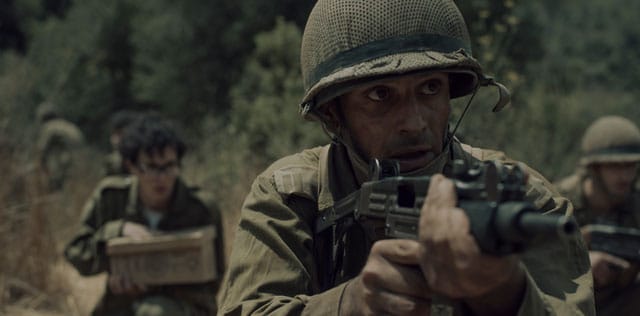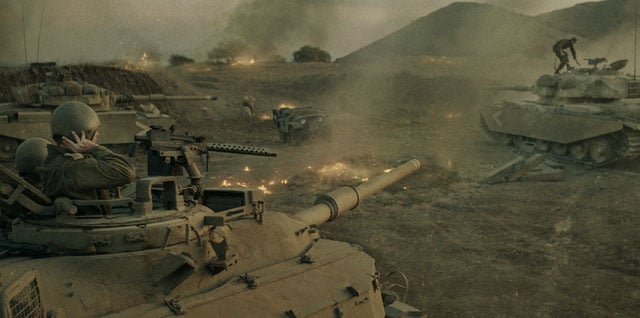 Photos by Vered Adir/HBO Max
Photos by Vered Adir/HBO Max As Yom Kippur began in 1973, attacks by Syria and Egypt took Israel by surprise, launching a 19-day war in which more than 10,000 Israeli soldiers were killed, wounded or captured. The conflict nearly destroyed the country and most Israelis find it too painful to talk about–until now. The 10-part miniseries “Valley of Tears, which premieres on HBO Max Nov. 12, has already debuted in Israel, and the intertwined battlefield stories it tells have had a deep and cathartic impact.
Created by Ron Leshem and Amit Cohen, who wrote it with director Yaron Zilberman, “Valley of Tears” depicts the war in all its desperate, unrelenting intensity while telling the stories of a famous father searching for his estranged soldier son, a vastly outnumbered tank platoon, and an intelligence analyst and commander who must rely on each other to survive.
Shot in Israel before the pandemic, its cast includes Lior Ashkenazi, Aviv Alush, Joy Rieger and Shahar Tavoch as the officer monitoring radio transmissions whose warnings about the Syrian attack go unheeded until it’s too late. Although the characters are fictional, they’re inspired by real people and incidents, some of which had particular resonance for Leshem and Cohen, as they told the Journal from their homes in Boston and Los Angeles via Zoom.
“The mission was to create characters and embed them in real events. The first thing we did was to build very thorough research. Then when we were 100% confident, this is where drama took over,” Cohen said. “It’s all about characters and their journeys. The challenge was to tell emotional stories in the setup of a war.” And, added Leshem, “We wanted to make sure that the characters and conflicts in it are conflicts we haven’t seen in previous war stories.”
Bonds of friendship, love and brotherhood are explored. Themes of sacrifice, heroism, leadership blunders and the Israeli Black Panther movement are represented. But it’s the story of Avinoam, the young intelligence officer, who most reflects the creators’ experience. Cohen and Leshem served in an intelligence unit in the IDF in the mid-1990s, and Cohen’s father, also an intelligence officer, was stationed near the Israel-Egypt border in ’73 when the Egyptians bombed his base. “[Avinoam] has so many secrets and he knows what will happen if he falls into Syrian hands. Being in the intelligence unit, we knew it too,” Leshem said.
He and Cohen began writing the series ten years ago, researching and creating the world with a team of noted Israeli authors who worked on different plotlines. “Then we took it all and blended into the script. But at that point, CGI and VFX were too expensive to do in Israel,” Leshem said. “One U.S. producer wanted to do it, but insisted that the characters speak English. We wanted to have Israeli actors speaking Hebrew.”
Once underway, the series—the most expensive ever made in Israel—posed “endless” challenges, such as “having to “take one tank and make it look like 300 with CGI. There are no tanks left from this war,” Leshem noted. After they were denied permission to import one–even for filming purposes–by Israeli law, “We had to build one,” added Cohen, who calls the series “a once in a lifetime project. We’ve had other shows in Israel, but this is so much more visceral. It’s an event, and everyone involved in it understood that,” he said.
Both writers are thrilled that “Valley of Tears” has elicited such a strong, positive reaction in Israel, breaking viewership and ratings records. “We thought no one might want to watch something so emotionally demanding during the pandemic, but the numbers were insane,” Leshem said. “Right now, Israel feels like it’s almost on the brink of a civil war. Everything is so divided and torn apart and fragile. We feel like we’re holding everything on our shoulders and in a second we could lose everything. This show has been bringing people together.”
“Right now, Israel feels like it’s almost on the brink of a civil war. Everything is so divided and torn apart and fragile. We feel like we’re holding everything on our shoulders and in a second we could lose everything. This show has been bringing people together”
—Ron Leshem
“It’s unbelievable, more than we expected,” echoed Cohen. “People who fought in the war are very emotional about it. Someone posted on Twitter that he hadn’t talked about it for 25 years and was crying after he saw the third episode. In Israel, it’s more than a TV show. It’s like therapy for the older generation and the younger generation understands for the first time what their parents went through. It has another impact: people want to learn about the war.”
The miniseries is not the only war-themed story from the pair. Leshem was nominated for the Best Foreign Language film for “Beaufort,” which he adapted from his bestselling novel about Israel’s withdrawal from Lebanon, and they wrote “No Man’s Land,” a Syrian civil war-set miniseries about to premiere on Hulu. Their other credits include the spy drama “The Gordin Cell,” remade in the U.S. as “Allegiance,” and thriller “False Flag,” an English-language version of which with Uma Thurman is now in production in the U.K. They also remain involved with “Euphoria,” which was delayed due to the pandemic and will now air its second season on HBO in 2021.
Regardless of the Yom Kippur War’s climactic and traumatic place in Israeli history, “Valley of Tears” is not meant to be a history lesson for the international audience. But Cohen hopes that viewers “will get a glimpse into a point in time and the most significant event in the history of Israel and the Middle East, to interesting characters, to unique voices. You don’t need to know the whole history to relate to it,” he said. “We hope that people will think it’s good television and will feel for the characters.”
The Marlene Meyerson JCC Manhattan will host a preview of the first two episodes and a live Q&A with Cohen, Leshem and Yaron Zilberman on Nov. 10 at 3 p.m. PT. Tickets cost $5. Click here [https://mmjccm.org/programs/virtual-screening-and-qa-hbo-maxs-valley-tears] to register.
“Valley of Tears” begins streaming Nov. 12 on HBO Max.






















 More news and opinions than at a Shabbat dinner, right in your inbox.
More news and opinions than at a Shabbat dinner, right in your inbox.